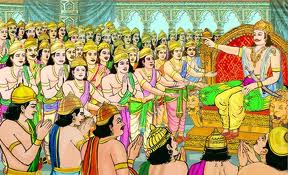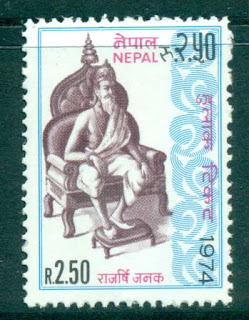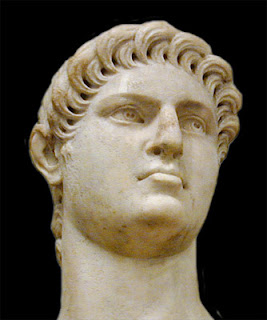
Tale of Two Cities: Complaint & Compliment
Rome burned, Nero fiddled; Mithila burned, Janaka Unperturbed.
Tale of Two ‘Burnt’ Cities indeed! Rome and Mithila!
Lord Krishna in Bhagavad Gita (III-20) praised Janaka as an illustrious king. Tamil poet Subramanya Bharathi praised him sky high for being unperturbed while his capital city Mithila burned. All compliments!!Mithila is identified with the modern Janakpur in Nepal. Janaka ruled the country of Videha with Mithila as its capital at least 2600 years ago.
While Rome burned, Nero fiddled. This expression is used in English with a negative connotation. It is used for heedless and irresponsible behaviour in the midst of a crisis! All complaints!! Nero ruled Rome in the first century. Rome burned in 64 AD.
What is the logic? One king is accused of inaction and another was complimented for inaction .First, we must know the truth behind the anecdotes. Rome burned in 64 AD for six days. Nero took action to control the fire and to mitigate the miseries of the people according to Tacitus. There is no truth in the saying that he ‘’fiddled’’. Because there was no fiddle in the world at that time!! It was invented 1500 years after Nero. But he did play on some instrument. Cassius Dio said that Nero sang “Sack of LLium’’ in the stage costume when the city burned. But Tacitus says it was a rumour that he played his lyre at that time. One thing is clear that he annoyed the people by doing something. There is no smoke without fire.
If someone doesn’t take decisive action to control the fire and avoid the miseries of people, one will be condemned. We hear this type of complaint even today during major fire accidents.

What about Janaka who ruled from Mithila? Let us hear the story in the words of Swami Sivananda:
Raja Janaka was a full-blown Jnani though he worked in the world. His Jnana was tested. He was in the Durbar hall when a messenger brought the news that there was fire in the city. Janaka said: "My wealth is unlimited, and yet I have nothing. Even if the whole of Mithila is burnt, yet nothing is lost to me."
The name of Raja Janaka is always associated with Karma Yoga and Karma Nishtha. In the Gita also Lord Krishna speaks to Arjuna: 'Janaka and others indeed attained perfection by action; then, having an eye to the welfare of the world also, thou should perform action. Whatever a great man does, that other men also do; the standard he sets up, by that the people go. Therefore, without attachment, constantly perform action which is duty, for by performing action without attachment, man verily reaches the Supreme.' Ch. III- 19, 20, 21.
Another scholar Sri Chinmoy of Bengal narrated the same anecdote in the following words:
“Possession is no satisfaction, so long as ego breathes in us. The great King Janaka knew it. No wonder Janaka was loved by the Sage Yagnyavalka most. His Brahmin disciples felt that Janaka received preference just because he was king. It is obvious that God would not let the Sage Yagnyavalka suffer such foul criticism. So, what happened? Mithila, Janaka’s capital, began to burn in mounting and devouring flames. The disciples ran, left their preceptor, hurried to their respective cottages. What for? Just to save their loin-cloths. All fled save Janaka. He ignored his riches and treasures burning in the city. Janaka stayed with his guru, Yagnvavalka, listening to the sage’s ambrosial talk. “Mithilayam pradagdhayam namekincit pranasyati".. “Nothing do I lose even though Mithila may be consumed to ashes.” Now the disciples came to learn why their Guru favoured Janaka most. This is the difference between a man of wisdom and a man of ignorance. An ignorant man knows that what has is the body. A man of wisdom knows that what he has and what he is the soul. Hence to him the soul’s needs are of paramount importance.

Sri Krishna disclosed to Arjuna the secret of Janaka’s attainment to Self-realisation and Salvation. Janaka acted with detachment. He acted for the sake of humanity, having been surcharged with the light and wisdom of divinity. Indeed, this is the path of the noble”.
Of course no loss of life was reported from both the fires. Officials in charge would have taken the necessary action. This shows the different approaches for the same problem. Even in the case of Nero, no one can blame him if he was as serene and calm as Janaka; as detached as Janaka.
If one knows the background of Janaka, one can appreciate his approach more: “Raja Janaka once commanded a Brahmin who committed a serious crime to leave his dominion at once. The Brahmin said: "O Rajan, kindly tell me the extent of your dominion. Then I will leave your state and settle down in the dominion of another Rajan". Janaka did not say anything in reply. He sobbed heavily. He reflected seriously. Then he swooned suddenly. He came back to his senses after fifteen minutes. He then said: "I have inherited the state of my father. It is under my control, but nothing belongs to me exclusively. I cannot find my exclusive dominion anywhere, not even in Mithila and in my own progeny. Now real wisdom has dawned in me. I am now under the impression that either I have no dominion at all or all is my dominion. Either this body is not mine or the whole world is mine, and similarly that of others too. O best of the twice-born! This is my firm conviction. Stay in my dominion as long as you like and enjoy."
The Brahmin asked: "O king! What has made you regard this kingdom as not yours or all as yours? How have you renounced the feeling of 'mine-ness' in this kingdom of your ancestors, which you are ruling?" Janaka replied: "Everything is perishable on the physical plane. Life is evanescent. Everything passes away. I could lay my finger on nothing which I could call as mine. I remembered the Vedic text: 'It was anybody's property.' I reflected in this manner and so I have given up the idea of 'mine-ness'. Hearken carefully now as to how I see my dominion everywhere. I have no desire for the objects that give good smell: so I have conquered the earth. I have no desire for tasty things, beautiful forms, soft cushions or beds, or music: therefore I have conquered water, fire, air and ether. I do not desire anything for the mind, it is therefore under my perfect control. I do actions for the Devas, ancestors, for all beings and for those who come to my door."
Then the Brahmin smiled and said: "O king! I am Dharma in disguise. I have come to learn something about you. You are the only person to turn this wheel, the name of which is Brahman, the spoke of which is reason, which never turns back and which is kept to its course by the quality of goodness as its circumference." (Anugita: Ch. 17). (Excerpt is from Swami Sivananda)
******
